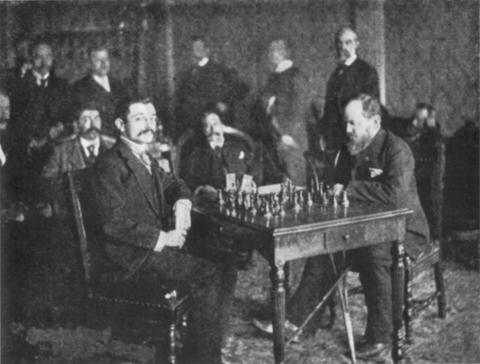As has already been mentioned, after his victory against Steinitz in 1894, the chess world was not keen on recognizing Lasker as the lawful world champion. Siegbert Tarrasch, who had just won another international tournament, Leipzig 1894, exclaimed that: „The final games of the match merely provoke profound regret. Whereas in the initial games, especially the seventh, the usual strength of the old master is no longer apparent, the remainder increasingly resemble the last games of Zukertor, who late in life completely lost his inherent strength, resourcefulness, initiative, confidence.“ (Source: Garry Kasparov On My Great Predecessors, Part one, Page 126)
Thus, Lasker had to prove he was worthy of the title. The first opportunity arose at the strong international tournament in Hastings 1895. Apart from Lasker, Steinitz, Tarrasch and Chigorin also participated. The point of the tournament was to resolve the confusion at the chess summit. It goes without saying that it came as an incredibly shock when hitherto unknown Harry Nelson Pillsbury claimed the win, half a point of Chigorin and one point ahead of Lasker. Therefore, the situation wasn’t resolved, but merely additionally confused.
At the conlcuding banquet of the Hastings tournament, Chigorin announced that top five prize winners are invited to international tournament in St. Petersburg next year. Apart from Tarrasch, who was unable to get a time off his job, Lasker, Steinitz, Pillsbury and Chigorin participated. Each of the participants played six games against each other. After a tough start, Lasker gained pace in the second half and won the tournament, with Steinitz coming behind him. This success heartened Steinitz, and he immediately issued a formal challenge to a World Championship match to Lasker.
Before that match, a strong tournament in Nuremberg was also played, with Lasker once again coming first. Steinitz’s perfomance was subpar, as he finished in the sixth place. Such a result predetermined his bad result in the match to an extent.

The match was held in Moscow and started on November 6,1896. The pre-match forecasts proved to be accurate; with a score of 10-2 Lasker decimated Steinitz and defended his title with ease. It seems that the match result was a vivid prophecy of the subsequent fates of the players. Just four weeks after the match, Steinitz lost his mind and had to seek psychiatric help. Lasker, on the other hand, took a three year long break from chess, devoted himself to mathematical studies and went on to held the title longer than anyone else in the history – a further 25 years.


Pingback: Wilhelm Steinitz Birthday - Chessentials